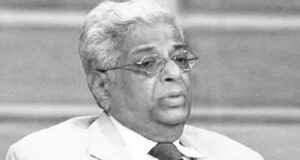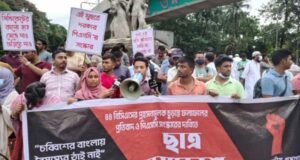
Prime Minister Sheikh Hasina on Friday laid emphasis on an amicable end to the Ukraine war, saying international cooperation in this time of growing instability is clearly vital to the vulnerable among the global community to build resilience against future shocks.
“The prolonging war and the imposed sanctions and counter sanctions continue to destabilise the world. Each passing day of the war take as well as destroy many lives in the conflict zone, and also in the far-reaching corners of the world,” she said in her speech during virtual participation in the Global Crisis Response Group (GCRG), BSS reports.
She said: “Sadly, as we today deliberate the ever-growing crisis and its devastating effects on humanity, the conflict in Ukraine goes on.”
In fact, newer sophisticated armaments of war are being introduced everyday bringing yet more destruction causing severe adverse effects on people’s lives all over the world, she added.
Sheikh Hasina mentioned that poverty and inequalities continue to rise sharply, and the debt burden for the poorer countries to swell.
“These and other shocks have driven up the prices of food, energy, and other commodities the world over, causing delay in the progress of Sustainable Development Goals,” she observed.
She said that Bangladesh, as an energy and food-importing country, has been suffering from rising import bills, increasing inflation, and stress on foreign currency reserve.
In this connection, the Bangladesh premier highlighted a few specific thoughts of her to build resilience against future shocks.
Sheikh Hasina, in her first thought, said, “We urgently need a reformed international financial architecture providing fiscal space to LDCs and developing countries with access to concessional, low-cost, low-interest-rate funds, with no strings attached.”
Developing countries must also have easy access to funds in times of crises and disasters, including equitable access to IMF’s SDR funds during emergencies and also to funds from IFIs and MDBs at lower rates, which should actually be suspended till the crises have been overcome, she added.
Secondly, she said, the factors that affect food price and access, such as export restrictions, stockpiling and supply chains distortions must be addressed.
“In this regard, we fully support the (UN) Secretary General’s call to keep markets open, remove export restrictions and release food reserves to improve food supply,” she said.
The Prime Minister also congratulated Secretary General for his Black Sea Initiative that needs to be extended further to feed people and save lives.
In her third observation, she said that energy has to be managed prudently, alongside also reducing energy imports by domestic energy mix, and renewable energy.
“Our government supports energy transition by providing policy support and encouraging domestic public and private investments in energy sectors, and on green energy transition,” she added.
Food and energy security and climate change are connected, mentioned Sheikh Hasina in her fourth thought, saying burning of fossil fuels drives climate change which increases frequency and intensity of natural disasters.
“This again affects agriculture, food production and human displacement,” she said, adding: “Therefore, transition to sustainable energy, food production, and climate actions are imperative.”
Finally, the premier said that she believes the GCRG’s recommendations from its three Policy Briefs and the report “A World of Debt” are excellent, which will facilitate decision-making and global consensus on necessary actions. “We must all champion the ‘Key Asks’ of our interest,” she added.
Turning to Bangladesh, Sheikh Hasina mentioned some of her government’s measures in supporting the people during the difficult times and said: “These are showing some signs of our economy turning around giving us a sense of relief.”
“We had to make some tough fiscal and policy choices to reach this point,” she said, adding, “We had to limit import of non-essential and luxury items; withdraw critical subsidies in the energy sector; cut down overall expenditures in the public sector; negotiate a loan package of US$ 4.7 billion with IMF as a precautionary measure; work hard to keep inflation down; encourage our people to grow food leaving no land uncultivated, among others.”
“Importantly, we made sure that no person suffers from lack of food,” she continued.
Regarding the climate change issues, the Bangladesh premier said that this year, 2023, is meant for stocktaking of implementation of the Paris Agreement. “We wish to see concrete progress on ‘Loss and Damage Fund’, and access to available climate funds streamlined,” she said.
“Also, developing countries should not be affected by the proposed carbon levy in the shipping sector,” said Sheikh Hasina, adding, “We expect to see projects launched under the Global Shield against Climate Risks.”
Appreciating technical assistance for designing and launching own Green Bonds, she said, “We are looking forward to global consensus and political will to address all these and other issues.”
UN Secretary-General António Guterres delivered the welcome address, while UNCTAD Secretary General Rebeca Grynspan made presentations in the GCRC.
President of the Republic of Senegal Mackey Sall, Bangladesh Prime Minister Sheikh Hasina and Prime Minister of Barbados Mia Mottley delivered their speeches as champions.
Besides, Coordinating Minister for Economic Affairs of Indonesia Airlangga Hartarto, Indian Minister for External Affairs Dr. Subrahmanyam Jaishankar, Minister for Development Cooperation and Global Climate Policy of Denmark Dan Jørgensen, State Minister for Foreign Affairs of Japan YAMADA Kenji and State Secretary in the Federal Ministry for Economic Cooperation and Development of Germany Jochen Flasbarth also spoke as Observers.
 Weekly Bangla Mirror | Bangla Mirror, Bangladeshi news in UK, bangla mirror news
Weekly Bangla Mirror | Bangla Mirror, Bangladeshi news in UK, bangla mirror news







